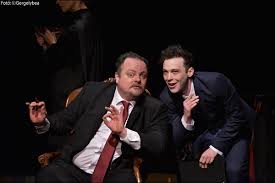
With September 2021 upon us, theatre life begins anew!
Here is a sampling of the live performance options.
Entries are arranged by theater or venue.
Budapest Bábszínház (Puppet Theater)
Semmi [Nothing] Climb four flights of stairs to the Lili Ország Studio and try to get a seat in the front row on the left side for this puppet show adaptation of the nihilistic Danish young adult novel by Janne Teller. When 7th-grade Pierre becomes a malcontent, his classmates sacrifice their favorite things to demonstrate what is good about life. (This part is rather predictable.) Then comes a second round and – whoa, how morbid will they go?! As the characters make their ultimate sacrifices, they put away their puppets (childhood selves) and continue to perform as adults. There are still some twists in store, and it is all punctuated by good rock numbers performed by the cast. An entertaining show! September 29, 30
Budaörsi Latinovits Színház (Latinovits Theater of Budaörs)
Rekviem egy álomért [Requiem for a Dream] This production captures the almost unbearable atmosphere of Hugh Selby, Jr.’s work (including psychedelic effects to indicate drug use) and offers a grim view of consumer society’s idiocy. Overall, the acting is brilliant, especially Kati Takács in the iconic role that garnered Ellen Burstyn an Oscar nomination. September 3, 4, 5, 14
Eiffel Műhelyház (Eiffel Opera – Locomotive Hall)
This out of the way venue has hosted an increased number of big productions while the State Opera House is still under renovation. Don’t be afraid to make the journey out to this unique setting for opera.
Carmen This mildly modern take on Carmen has swept the opera world, and yet the six hollowed-out cars onstage can seem somewhat gimmicky. Also, my companion and I were troubled by the female stereotypes and casual misogyny in the staging. Nevertheless, the music was splendid, the plot is never boring, and Szabolcs Bruckner’s Don José was fearsomely convincing. Andrea Szántó was good, but seemed to lack directorial support as Carmen. Zsolt Haja was sadly disappointing as the matador. Hold out for Gábor Bretz in this great baritone role. September 3
Erkel Színház (Erkel Theater)
The Erkel is the main venue for the Hungarian State Opera’s performances now that the traditional opera house is under reconstruction. You can find it in the recently renamed Pope John-Paul II Square (II.János Pál papa tér) or turn onto Luther Street from Rákóczi Avenue.
Salome Personally, I feel Richard Strauss’ music dampens the feverish momentum of Oscar Wilde’s original theatre gem, but if it is a tradition, by-the-book staging that you are seeking, look no further. The set and costumes could be a facsimile of the original. Only pay attention to the singers. The overall quality can vary wildly depending on the casting. September 19, 26, 29
Katona József Színház (József Katona Theater)
A bajnok [The Champion] Whether or not you are aware of the sex scandal upon which it was based, this Béla Pintér work is a fascinating and effective adaptation of Puccini’s one-act opera Il tabarro, with the political elite of a small Hungarian town standing in for the dock workers of the original. A daring and mostly stellar cast sings its way through the updated libretto about politics, sexuality, and parental responsibility. September 4
Nemzeti Színház (National Theater)
Csíksomlyói passió [Passion of Christ from Csíksomlyó] The 18th-century Hungarian re-interpretation of the Biblical story seems made for the National, but then there is a confusing clash of styles. Director Attila Vidnyánszky erects an alternate seating area to bring the spectators closer to the action. A live ensemble transports us to a small village square where the Passion of Christ will be performed. Then, the loud canned music and bombastic special effects begin, together with repetitive stage gestures that make it seem like a three-hour movie trailer. Nándor Berettyán brings a peculiar cluelessness to the role of the Messiah, as though the other villagers pushed him onto the scene as a last-minute substitute. Meanwhile, narrator and raconteur András Berecz strives mightily to bridge the gap between the professional actors and the folk dancers who embody the villagers and the vox populi, but this is a production divided against itself. September 10
Radnóti Színház (Radnóti Theater)
10 Both thematically and structurally reminiscent of Krzystof Kieślowski’s Dekalog, Csaba Székely’s new play is structured around the interlocking tales of ten residents at the Hope Housing Estate, each of whom represents one of the Ten Commandments that they break. Who are these characters? A saintly young man with intellectual disabilities, a man with body dysmorphic disorder, an incest survivor-turned-prostitute (the only character identified as Roma), a workaholic female head doctor, a soldier in Afghanistan with abandonment issues, and a bored trophy wife, among others. The writing can be heavy-handed, and some actors fall into the trap of overacting. Others have moments of brilliance. Yet, the duration is well over three hours, and the last hour is spent tying up plot threads. A recurring theme is emotional blindness, most obvious in the case of a narcissistic paintress who can see others’ auras, but is insensitive to their pain. Blocks of assisted storytelling are separated by interludes wherein the cast sings the Biblical text in a dead language. This is most powerful when the music sounds like modern gospel. Transylvanian director Aba Sebestyén uses plenty of face-forward and two hand-held cameras to provide (occasionally effective) live visual effects, but this technique already seems old hat. September 16, 17
RS9 Színház (RS9 Theater)
Budapest’s nitty-gritty home for fringe and independent theatre is right in the center of town, either in the basement space (with accompanying bar) at 9 Rumbach Sebestyén Street or in the Vállai Kert space (named after the late actor Péter Vállai) just across the road.
Bankhitel [Bank Credit] Imre Baksa had success with this two-character piece before. Now he teams up with Sándor Tűzkő to enact Jordi Galceran’s lightweight take on capitalism, loans, and infidelity. I am curious if they have made use of the same animated clips, which so effectively hinted at the play’s larger themes. September 1, 16
Budapest fölött az ég [The Sky over Budapest] Essentially a modern Hungarian re-interpretation of Wings of Desire, this sprawling production spans three locations and over three hours. The ambition is startling, and there are some moments of brilliance; however, the meditations on what it means to be Hungarian are unlikely to move foreign members of the audience. While director Attila Menszátor-Héresz is a bit colorless as the lead angel, Rita Csáki steals the show as his Lucifer-like foil. Laszló Kassai and Katalin Mérai also provide their inimitable charm in a range of cameos. September 4, 5, 29
De mi lett a nővel? [But What Became of the Woman?] Much in the style of Complete Works of Shakespeare (Abridged), three Hungarian actors romp their way through nine related short stories by Chekhov. Their spirit is infectious, and they capture the master’s bizarre humor, often balanced on the razor’s edge of tragedy. Initially, they explore characters too self-centered to recognize other people’s pain, before evoking the legendary actress referred to in the title, an elusive and ultimately unattainable object of desire. September 2
Egy perccel tovább [One Minute More] Gábor Jászberényi and Zsófia Kondákor play out variations on the emotional life of a couple, but despite their commitment, it is a 75-minute trip to nowhere. September 25
Tizenegyes kórterem [Hospital Room 11] A very promising play written by newcomer Tamás Tóth tackles the familiar trope of the mental patient who has an enlightening and potentially dangerous effect on his fellow inmates. Seemingly set in modern times and in a French asylum, the show benefits from committed performances by László Kassai (as the head psychiatrist) and Gábor Jaszberényi (as the young man who believes he is St. Martin). September 6, 7
Stúdió K (Studio K)
A rettentő görög hős [The Fearsome Greek Hero] Stúdió K has a long tradition of brilliant puppet shows for children, and this rendering of the exploits of Theseus is certainly one of them. It is a great introduction to these tales from Greek mythology, and young theatergoers relish the scenes of stylized violence. September 19
Szkéné Színház (Szkéné Theater)
A nagy füzet [The Notebook] Deploying a bizarre mix of elements – offbeat casting, dance, and strange use of food as props – this adaptation of Ágota Kristóf’s bleak World War II novel is remarkably stimulating with a hypnotic final tableau. Just be familiar with the story beforehand. The actors deliver chunks of prose at top speed. September 14
A sütemények királynője [The Queen of Cakes] Mostly one concentrated scene of domestic misery. Béla Pintér tackles the topic of child neglect and abuse like no other Hungarian playwright, also turning in a brave performance as the tyrannical father. The cast is solid, and the effect is brutal, although the ending is too rushed. September 16, 17, 18
Anyám orra [My Mother’s Nose] Like some of Béla Pintér’s pieces, this exploration of moral insanity is arguably a trip to nowhere. Still, it is a thrilling and imaginative ride, and the final tableau is a knock-out. Undeniably memorable. September 24, 25, 26
Bányavakság [Mine Blindness] The second (and most satisfying) installment of Csaba Székely’s trilogy about modern life for Hungarians in Transylvania focuses on politics, scandal, and blackmail, topped off with a dollop of ethnic tension and violence. The misery may seem a bit overdone by the end, but Gergő Kaszás is spectacular in the lead role. September 19
Caligula helytartója [Caligula’s Deputy] Transylvanian playwright János Székely’s drama (set in Ancient Roman times, but with parallels to despotic Communist rule) is a modern classic. It receives a fine production here with thoughtful (and by no means boring) direction by Rémusz Szikszai and a fine turn by Gábor Nagypál in the title role. September 27
Parasztopera [Peasant Opera] Béla Pintér’s classic theatrical confection blends folk dancing and music with baroque recitatives to serve up an opera plot set in the isolated Hungarian countryside complete with murder, infidelity, and incest. It all culminates with a fateful retribution which inspires both pity and fear. With this production, Pintér perfected the comic dissonance of characters singing Hungaricums like “The chief railway officer is drunk as a pig!” or improbabilities like “I was attending a Lutheran conference in Minnesota” to classical-sounding airs. The show is imaginative and brilliant. A must-see! September 20, 21
Tesla Teátrum (Tesla Theater)
Feljegyzések az egérlyukból [Notes from the Underground] Radnóti Theatre’s studio space hosts this production by the Füge Company, which brings detailed physical acting to this succinct and faithful adaptation of Dostoevsky’s classic. The staging is simple, and the cast is strong overall. By not straining to make the atmosphere oppressive, they provide a clear portrait of human frailty and insignificance. September 15
Városmajori Szabadtéri Színpad (Open-Air Stage in Városmajor)
Ünnep [The Celebration] This adaptation of the 1998 Danish film enjoyed a successful run at the Pesti Theatre years ago, and this version by the National Theatre of Miskolc does not shy away from this dark tale of incest and sexual abuse. I found the use of live camera effects rather alienating, and the use of canned music seemed wildly out-of-place. (The film was part of the short-lived Dogme movement, which forbade the use of non-diegetic music.) Actors András Lajos and Bernadett Szirbik are extraordinary, but Tibor Gáspár is no where near ruthless enough as the unrepentant patriarch. Also, why is the protagonist seemingly cured of his sexual ambiguity at the end when he runs off to Paris with the maid? Is this “happy ending” his reward for confronting his abuser? September 2
Vígszínház (Comedy Theater)
A Pál utcai fiúk [The Paul Street Boys] It is hard to get tickets for the 2016 musical adaptation of Ferenc Molnár’s classic children’s novel, which is a lighthearted take on a two rival gangs and their battle for possession of a splendid lot, and no wonder! The cast is spirited, the direction is sharp, and the music is catchy without being disturbingly thin (which is the case for most modern musicals). The climactic stand-off is staged very symbolically before the tear-jerking finish: the martyrdom of Ernest Nemecsek for what proves to be a meaningless cause. Depressing allegory? Perhaps, but integral to the Hungarian psyche. September 11, 12
Játék a kastélyban [The Play’s the Thing] This classic meta-theatre exercise by Ferenc Molnár is a gem, but by all means, avoid the current production in which the uneven cast tends to fumble the comedy. The leading role of Turai, the mastermind playwright, can be a tour de force for an actor, but Miklós Benedek mostly mumbles his way through it. September 16
See you at the theatre!
A bejegyzés trackback címe:
Kommentek:
A hozzászólások a vonatkozó jogszabályok értelmében felhasználói tartalomnak minősülnek, értük a szolgáltatás technikai üzemeltetője semmilyen felelősséget nem vállal, azokat nem ellenőrzi. Kifogás esetén forduljon a blog szerkesztőjéhez. Részletek a Felhasználási feltételekben és az adatvédelmi tájékoztatóban.




